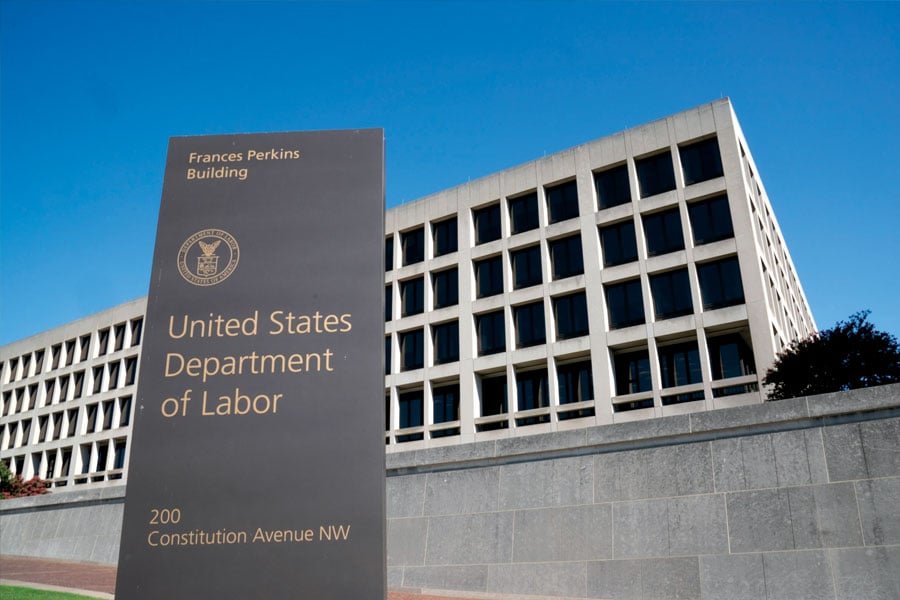

A Labor Department official said Thursday he still has qualms about Fidelity Investments’ cryptocurrency product for retirement savings following talks with the company.
Ali Khawar, DOL acting assistant secretary and head of the Employee Benefits Security Administration, said he's spoken to Fidelity officials about the Digital Assets Account the company announced last month. The product will allow retirement plan participants to allocate a portion of their assets to Bitcoin through an option on their employer’s 401(k) investment menu.
Fidelity announced the product a few weeks after the DOL released guidance warning retirement plan fiduciaries to use “extreme care” when considering crypto investment offerings.
Fidelity said last week that it's talking with regulators and lawmakers about consumer safeguards that are included in its crypto product. But Khawar said he still has misgivings.
“We didn’t leave that conversation feeling comfortable that all our concerns were unfounded, unwarranted, resolved by what they’ve done,” Khawar told reporters on the sidelines of the Insured Retirement Institute’s annual conference in Washington.
When asked whether the discussions left him feeling better, worse or about the same regarding Fidelity’s crypto product, Khawar indicated his position hasn’t shifted.
“I definitely don’t feel better,” he said. “I don’t know if I feel worse or the same. This is an important issue to us.”
He said the agency’s conversations with Fidelity have been forthright. “There was a fairly cordial but candid exchange of views,” Khawar said. “I think they understand the concerns we have. I’m sure we’ll be talking more.”
A Fidelity official said that its crypto product is a responsible way to “meet the demands of mainstream interest in digital assets” and that the company would continue talking to regulators, policymakers and consumers.
“Several layers of consumer safeguards apply to the DAA, including the inherent protections of a workplace retirement plan, the features of the account such as excessive trading oversight and institutional security, plan sponsor imposed limits on allocations to the DAA, and leading educational resources to help inform participants understand whether exposure to bitcoin is right for their risk tolerance,” Dave Gray, Fidelity’s head of workplace retirement offerings and platforms, said in a statement.
Retirement plan fiduciaries and the financial advisers who work with them are caught between DOL’s warning about crypto and the imprimatur of Fidelity, the largest retirement plan administrator, on using it. Crypto investing is increasing in popularity, although the market has declined precipitously in recent weeks.
The DOL guidance doesn't prohibit crypto investing in retirement accounts. It emphasizes that plan fiduciaries must evaluate it as they would any other investment.
“We don’t think we said something new on fiduciary obligations,” Khawar said.
On another regulatory front, he didn’t offer any hint of when to expect the next iteration of the DOL’s fiduciary rule for retirement accounts.
The agency let most of the Trump administration’s rule go into force in February, while another piece regarding record keeping for rollovers will be implemented in late June. The agency includes on its regulatory calendar a pending rule proposal about the definition of fiduciary.
Observers anticipate the proposed rule will increase the number of financial professionals — including insurance agents — who are considered fiduciaries for retirement investing and who will have to follow the agency’s conduct standards to qualify to receive commissions and other third-party payments.
“It’s something we continue to work on,” Khawar said during an IRI session. “I don’t have a specific date to share.”

Relationships are key to our business but advisors are often slow to engage in specific activities designed to foster them.

Whichever path you go down, act now while you're still in control.

Pro-bitcoin professionals, however, say the cryptocurrency has ushered in change.

“LPL has evolved significantly over the last decade and still wants to scale up,” says one industry executive.

Survey findings from the Nationwide Retirement Institute offers pearls of planning wisdom from 60- to 65-year-olds, as well as insights into concerns.
Streamline your outreach with Aidentified's AI-driven solutions
This season’s market volatility: Positioning for rate relief, income growth and the AI rebound
